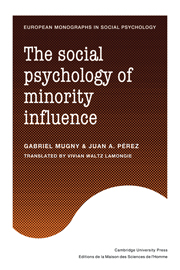Coping with Minority Status
Society consists of numerous interconnected, interacting, and interdependent groups, which differ in power and status. The consequences of belonging to a more powerful, higher-status 'majority' versus a less powerful, lower-status 'minority' can be profound, and the tensions that arise between these groups are the root of society's most difficult problems. To understand the origins of these problems and develop solutions for them, it is necessary to understand the dynamics of majority-minority relations. This volume brings together leading scholars in the fields of stigma, prejudice and discrimination, minority influence, and intergroup relations to provide diverse theoretical and methodological perspectives on what it means to be a minority. The volume, which focuses on the strategies that minorities use in coping with majorities, is organized into three sections: 'Coping with Exclusion: Being Excluded for Who You Are'; 'Coping with Exclusion: Being Excluded for What You Think and Do'; and 'Coping with Inclusion'.
- Deals with a topic of both practical and theoretical importance, namely how minorities cope with their social environments
- Brings together work from several research traditions (stigma, prejudice and discrimination, minority influence, intergroup relations)
- Discusses a wide range of minority coping strategies
- Includes work on how minorities cope with majority inclusion as well as exclusion
Reviews & endorsements
“Fabrizio Butera and John Levine have gathered an illustrious group of world-renowned scholars. Their Coping with Minority Status gives us solid theory, intriguing research findings and, last but not least, scores of practical insights. A must-read for anyone seeking a better understanding of the roles ethnic, social, religious, or political minorities have in these turbulent times.“
– Carsten K.W. De Dreu, University of Amsterdam
“Coping with Minority Status offers unique and valuable perspectives on an important yet still largely understudied aspect of intergroup relations: how minority group members adapt to or actively try to change their group’s status. The chapters, written by leading international scholars on intergroup and intragroup processes, consider how being a member of a minority group affects the ways people think, feel, and relate to others, as well as examine the broad range of responses (including terrorism) that minority groups use to influence dominant groups. The volume is impressive in its scope, but even more impressive is the depth and originality of insights that it presents. It is essential reading for anyone interested in this area and will help shape the course of scholarship on this topic for many years to come.“
– John F. Dovidio, Yale University
“There is a lot to like about this volume, which presents an informative overview of the current work of influential researchers in the field of minority-majority relations. The collection of chapters reflects the spectrum of theoretical and methodological approaches that contemporary psychology, and especially social psychology, contributes to the study of such important phenomena as stigma, prejudice and discrimination, and minority influence. In dealing with phenomena of high social and political import, the volume is a timely reminder that it is the raison d’être of social psychology to deepen our understanding of the connection between the individual/personal and the social/political.”
– Bernd Simon, Christian-Albrechts-University, Kiel
"...Employing social psychological precepts from a minority rather than the conventional majority point of view, editors Butera (Univ. of Lausanne) and Levine (Univ. of Pittsburgh) present a captivating rendition of minority experience in
this anthology... provide novel insights on intransigent problems, including terrorism... Must reading in group relations and minority studies... Highly recommended..."
– G. Parangimalil, Texas A&M University--Texarkana, CHOICE
Product details
August 2009Paperback
9780521671156
368 pages
229 × 153 × 20 mm
0.49kg
24 b/w illus. 2 tables
Available
Table of Contents
- Introduction Fabrizio Butera and John M. Levine
- Part I. Coping with Exclusion: Being Excluded for Who You Are:
- 1. On being the target of prejudice: educational implications Michael Inzlicht, Joshua Aronson, and Rodolfo Mendoza-Denton
- 2. To climb or not to climb? When minorities stick to the floor Margarita Sanchez-Mazas and Annalisa Casini
- 3. Managing the message: using social influence and attitude change strategies to confront interpersonal discrimination Janet Swim, Sarah Gervais, Nicholas Pearson, and Charles Stangor
- 4. A new representation of minorities as victims Serge Moscovici and Juan Pérez
- 5. Marginalization through social ostracism: effects of being ignored and excluded Kipling Williams and Adrienne Carter-Sowell
- Part II. Coping with Exclusion: Being Excluded for What You Think and Do:
- 6. Delinquents as a minority group: accidental tourists in forbidden territory or voluntary emigrées? Nicholas Emler
- 7. Minority group identification: responses to discrimination when group membership is controllable Jolanda Jetten and Nyla Branscombe
- 8. Coping with stigmatization: smokers' reactions to antismoking campaigns Juan Manuel Falomir-Pichastor, Armand Chatard, Gabriel Mugny, and Alain Quiamzade
- 9. Terrorism as a tactic of minority influence Xiaoyan Chen and Arie Kruglanski
- 10. The stigma of racist activism Kathleen Blee
- 11. Why groups fall apart: a social psychological model of the schismatic process Fabio Sani
- Part III. Coping with Inclusion:
- 12. Multiple identities and the paradox of social inclusion Manuela Barreto and Naomi Ellemers
- 13. Pro-minority policies and cultural change: a dilemma for minorities Angelica Mucchi-Faina
- 14. Influence without credit: how successful minorities respond to social cyptomnesia Fabrizio Butera, John Levine, and Jean-Pierre Vernet
- 15. Influence and its aftermath: motives for agreement among minorities and majorities Radmila Prislin and Niels Christensen.








